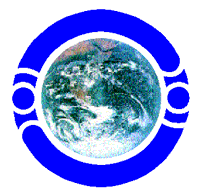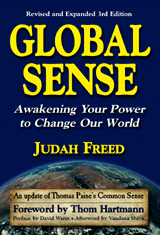Global Sense was
written in summer 1997 after hearing the scare stories
about Internet technocrats trying to use their "generic
Top-Level Domain names Memorandum of Understanding"
(gTLD-MoU) as a ruse for taking over domain name system
policymaking, apparently acting at the behest of world
trademark holders. A very scary story, but is it true? We
live in a world where anything and everything is
possible, but what is probable here?
Global Sense was my
method for thinking about the implications of the "gTLD"
plan for network governance. We're witnessing the
privatazation of our public utility without any public
vote in the matter. The internet is a powerful cultural
force, so I do not wish to see a despotic Internet regime
spawn despotism in the world. Given the acts of leading
players through ICANN,
my concerns are more justified today than ever before.
The reasons for adopting open network democracy in
Global Sense make more sense now than
ever.
Global Sense was built
from the reasoning in Common Sense. Thomas Paine
stated the case for the independence of a continent tied
to an island. Having seen monarchies subject people to
whims, having been inspired by the Enlightenment thinkers
and the spirit of his times, Paine envisioned a
constitutional democracy in a nation of laws, not
dictums. Foreseeing educated individuals accepting
responsibility for governing themselve, his deist beliefs
told him that humanity is quite capable of individual and
national self rule.
Now study the situation for
network democracy. Cyberspace is bound only by digital
server capacity in physical space. Like a galaxy tied to
a star, the decentralized network of networks demands
decentralized management, not hierarchial top-down
rulership by Internet royalty. Deeply media literate
people, aware of our common interactivity, are capable of
deciding Internet policy by direct democracy under a
global Internet constitition. In the spirit of our times,
therefore, becuase how we govern the internet does affect
how we govern the world, Global Sense attempts to
do for the Internet what Common Sense did for
America. An ambitious undertaking, but I'm more
evolutionary than revolutionary, I'm encouraging network
democracy in a grassroots way, one mind at a time, so a
desire for democracy springs from within us and endures.
I'm planting seedthoughts for tomorrow.
Global Sense closely
tracks the arguments that Thomas Paine applied in
Common Sense almost 225 years ago to present the
case for national independence. I'm mirroring his logic
to present the case for world interdependence. I've
paraphrased hm do discuss our situation today, and if
there are errors in the reasoning, the mistakes are mine,
not his When the essay was written in 1997, by the way,
the words rushed through me like wind. I did not touch
the work after posting it until late 1999, while redoing
the page layouts, Amazed and grateful by how little
revising was needed (the initial version in the
first
edition archive), I now
offer the essay for your consideration with minor updates
in reference to changing events. My prayer is that you
will be both informed and inspired from the
work.
For the record, I'm now
rewriting Global Sense into a book
that moves beyond the issue of network governance. I'm
writing about the cultural power of the global
sensibility emerging from a planetary network of
networks, the feelings of interactivity with one another
shifting how we interact in life. Knowing our
interactivity, we tend to practice responsible self
rule. We prevent freedom from decaying into anarchy.
Instead of becoming yet another drug to enthrall us,
interactive media instead could be a tool for our
liberation -- if "we the people" claim our power to
change the world through every interaction. Will we use
new media to help humanity masture enough at last for
democracy to work? Let is be so.
As you read, please appreciate
that here is the same core principle of unity amid
diversity known to the ancient sages, updated into media
terms that slip past our isms with simple logic.
Think about it. In our interactive world, personal
democracy makes global sense. 
Judah Ken Freed
May
2000. . .. . . .






